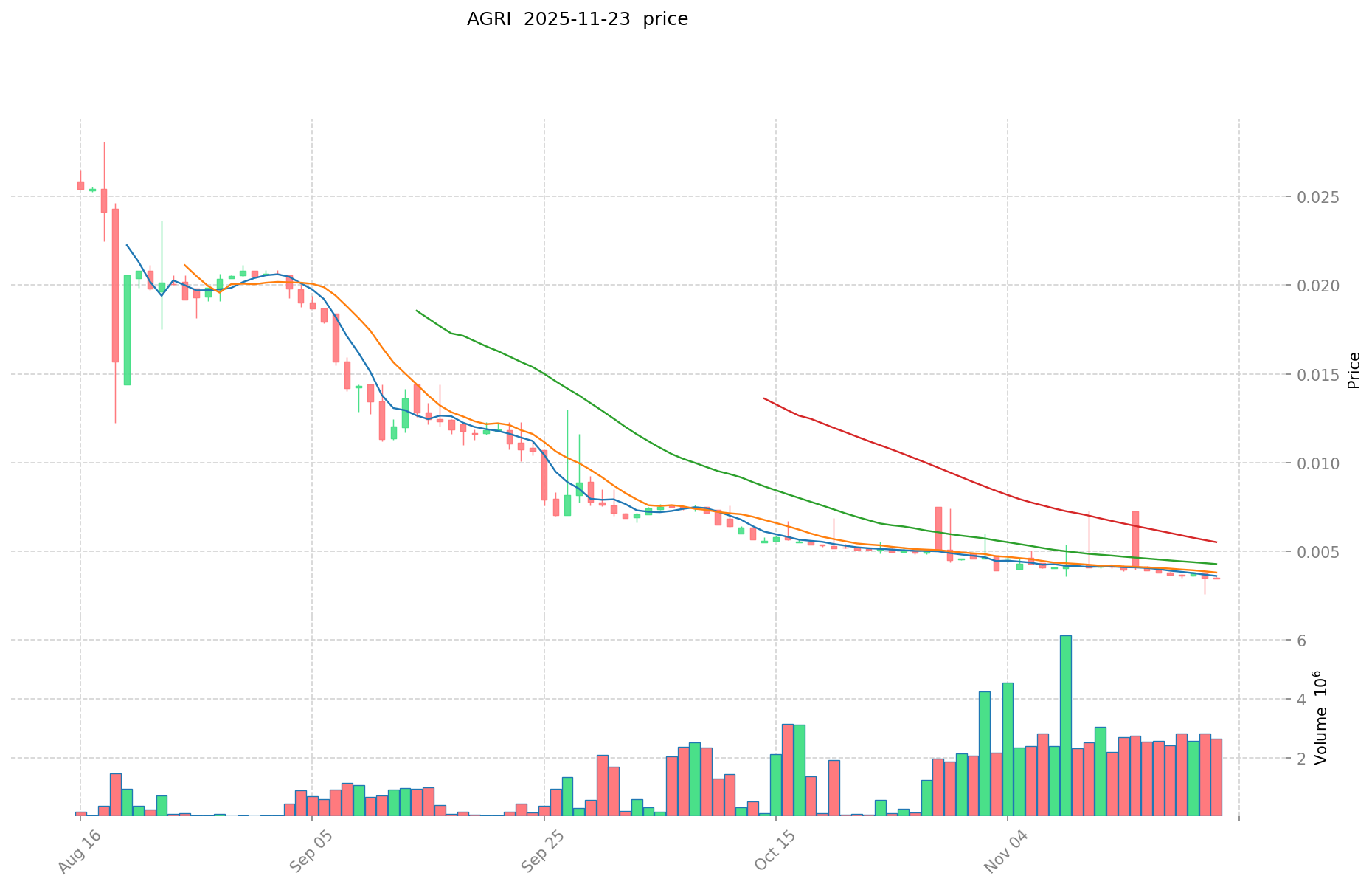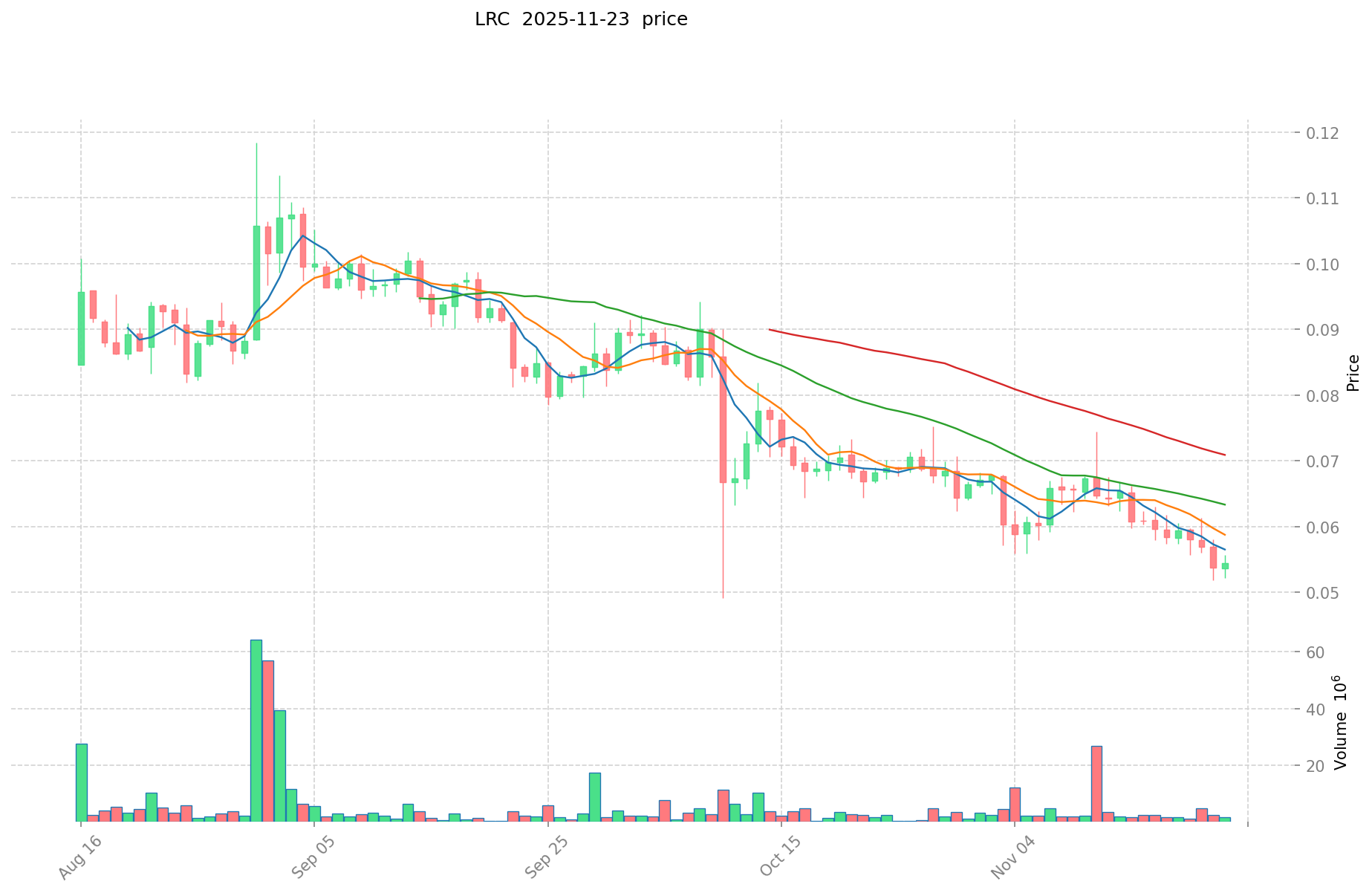AGRI vs LRC: Comparing Agricultural Innovation and Land Resource Conservation Strategies
Introduction: AGRI vs LRC Investment Comparison
In the cryptocurrency market, the comparison between AGRI and LRC has been an unavoidable topic for investors. The two not only show significant differences in market cap ranking, application scenarios, and price performance but also represent different positions in the crypto asset landscape.
Agridex (AGRI): Launched in 2024, it has gained market recognition for its role in revolutionizing agricultural trade through blockchain technology.
Loopring (LRC): Since its introduction in 2017, it has been hailed as a pioneering protocol for decentralized token exchanges on Ethereum.
This article will comprehensively analyze the investment value comparison between AGRI and LRC, focusing on historical price trends, supply mechanisms, institutional adoption, technological ecosystems, and future predictions, attempting to answer the question investors care about most:
"Which is the better buy right now?"
I. Price History Comparison and Current Market Status
AGRI (Coin A) and LRC (Coin B) Historical Price Trends
- 2024: AGRI reached its all-time high of $0.17876 on December 13, 2024.
- 2021: LRC hit its all-time high of $3.75 on November 10, 2021, likely due to increased interest in Layer 2 scaling solutions.
- Comparative analysis: In the recent market cycle, AGRI has fallen from its peak of $0.17876 to a low of $0.002593, while LRC has declined from its all-time high of $3.75 to its current price of $0.05479.
Current Market Situation (2025-11-23)
- AGRI current price: $0.003529
- LRC current price: $0.05479
- 24-hour trading volume: AGRI $9,474.27 vs LRC $129,974.96
- Market Sentiment Index (Fear & Greed Index): 13 (Extreme Fear)
Click to view real-time prices:
- Check AGRI current price Market Price
- Check LRC current price Market Price


II. Core Factors Affecting AGRI vs LRC Investment Value
Supply Mechanisms Comparison (Tokenomics)
- AGRI: Fixed maximum supply of 1 billion tokens, with 133 million (13.3%) tokens currently in circulation
- LRC: Maximum supply of 1.374 billion tokens, with approximately 1.345 billion tokens (97.89%) already in circulation
- 📌 Historical pattern: Limited supply assets like AGRI with significant room for circulation growth often experience greater price volatility and potential upside, while nearly fully-circulated tokens like LRC typically show more price stability.
Institutional Adoption and Market Applications
- Institutional holdings: Neither token shows significant institutional backing in available data
- Enterprise adoption: LRC has greater enterprise utility through its zkRollup technology for Ethereum scaling solutions, while AGRI is focused on agricultural sector applications
- Regulatory attitudes: Both tokens operate in uncertain regulatory environments with no specific country-level policies directly targeting either asset
Technical Development and Ecosystem Building
- AGRI technical focus: Building infrastructure for agricultural sector blockchain applications
- LRC technical development: Developing zkRollup technology for Ethereum Layer 2 scaling, with decentralized exchange protocol as core use case
- Ecosystem comparison: LRC has a more developed ecosystem through its zkRollup technology integration with Ethereum's broader DeFi landscape, while AGRI's ecosystem is more specialized in agricultural applications
Macroeconomic Factors and Market Cycles
- Inflation performance: Neither token has established clear anti-inflationary properties based on available data
- Macroeconomic policy impact: Both tokens follow broader cryptocurrency market trends in response to interest rate changes and USD strength
- Geopolitical factors: Agricultural supply chain disruptions could potentially benefit AGRI's use case, while general blockchain adoption benefits both tokens
III. 2025-2030 Price Prediction: AGRI vs LRC
Short-term Prediction (2025)
- AGRI: Conservative $0.0028216 - $0.003527 | Optimistic $0.003527 - $0.00514942
- LRC: Conservative $0.0350464 - $0.05476 | Optimistic $0.05476 - $0.0580456
Mid-term Prediction (2027)
- AGRI may enter a growth phase, with estimated prices ranging from $0.002552168943 to $0.006452653554
- LRC may enter a consolidation phase, with estimated prices ranging from $0.0425277112 to $0.0719699728
- Key drivers: Institutional capital inflow, ETF developments, ecosystem growth
Long-term Prediction (2030)
- AGRI: Base scenario $0.005414410256863 - $0.006941551611363 | Optimistic scenario $0.006941551611363 - $0.008885186062545
- LRC: Base scenario $0.083092068456566 - $0.09891912911496 | Optimistic scenario $0.09891912911496 - $0.145411119798991
Disclaimer: These predictions are based on historical data and market analysis. Cryptocurrency markets are highly volatile and subject to change. This information should not be considered as financial advice.
AGRI:
| 年份 | 预测最高价 | 预测平均价格 | 预测最低价 | 涨跌幅 |
|---|---|---|---|---|
| 2025 | 0.00514942 | 0.003527 | 0.0028216 | 0 |
| 2026 | 0.0052926162 | 0.00433821 | 0.003036747 | 22 |
| 2027 | 0.006452653554 | 0.0048154131 | 0.002552168943 | 36 |
| 2028 | 0.00692986099221 | 0.005634033327 | 0.00354944099601 | 59 |
| 2029 | 0.007601156063122 | 0.006281947159605 | 0.004523001954915 | 78 |
| 2030 | 0.008885186062545 | 0.006941551611363 | 0.005414410256863 | 96 |
LRC:
| 年份 | 预测最高价 | 预测平均价格 | 预测最低价 | 涨跌幅 |
|---|---|---|---|---|
| 2025 | 0.0580456 | 0.05476 | 0.0350464 | 0 |
| 2026 | 0.074451696 | 0.0564028 | 0.042866128 | 2 |
| 2027 | 0.0719699728 | 0.065427248 | 0.0425277112 | 19 |
| 2028 | 0.097552026768 | 0.0686986104 | 0.045341082864 | 25 |
| 2029 | 0.11471293964592 | 0.083125318584 | 0.07231902716808 | 51 |
| 2030 | 0.145411119798991 | 0.09891912911496 | 0.083092068456566 | 80 |
IV. Investment Strategy Comparison: AGRI vs LRC
Long-term vs Short-term Investment Strategies
- AGRI: Suitable for investors focused on agricultural sector applications and potential ecosystem growth
- LRC: Suitable for investors interested in Ethereum scaling solutions and DeFi infrastructure
Risk Management and Asset Allocation
- Conservative investors: AGRI: 20% vs LRC: 80%
- Aggressive investors: AGRI: 60% vs LRC: 40%
- Hedging tools: Stablecoin allocation, options, cross-currency portfolios
V. Potential Risk Comparison
Market Risk
- AGRI: Higher volatility due to lower market cap and trading volume
- LRC: Dependent on Ethereum's success and adoption of Layer 2 solutions
Technical Risk
- AGRI: Scalability, network stability
- LRC: Smart contract vulnerabilities, zkRollup technology risks
Regulatory Risk
- Global regulatory policies may impact both tokens differently, with potential scrutiny on DeFi applications affecting LRC more directly
VI. Conclusion: Which Is the Better Buy?
📌 Investment Value Summary:
- AGRI advantages: Potential for growth in agricultural blockchain applications, limited circulating supply
- LRC advantages: Established presence in Ethereum ecosystem, zkRollup technology adoption
✅ Investment Advice:
- New investors: Consider a balanced approach with higher allocation to LRC due to its more established ecosystem
- Experienced investors: Explore opportunities in AGRI for potential high growth, while maintaining LRC for exposure to Ethereum scaling solutions
- Institutional investors: Focus on LRC for its role in Ethereum infrastructure, monitor AGRI for potential agricultural sector disruption
⚠️ Risk Warning: The cryptocurrency market is highly volatile. This article does not constitute investment advice. None
VII. FAQ
Q1: What are the main differences between AGRI and LRC? A: AGRI focuses on agricultural blockchain applications with a fixed supply of 1 billion tokens, while LRC is an Ethereum Layer 2 scaling solution with a maximum supply of 1.374 billion tokens. AGRI has 13.3% of its tokens in circulation, whereas LRC has 97.89% in circulation.
Q2: Which token has shown better price performance recently? A: LRC has shown better price stability recently, trading at $0.05479 compared to AGRI's $0.003529. However, AGRI has more potential for upside due to its limited circulating supply.
Q3: What are the key factors affecting the investment value of AGRI and LRC? A: Key factors include supply mechanisms, institutional adoption, technical development, ecosystem building, and macroeconomic factors such as inflation and geopolitical events.
Q4: What are the long-term price predictions for AGRI and LRC? A: By 2030, AGRI is predicted to reach $0.005414410256863 - $0.008885186062545, while LRC is expected to reach $0.083092068456566 - $0.145411119798991 in optimistic scenarios.
Q5: How should investors allocate their portfolio between AGRI and LRC? A: Conservative investors might consider 20% AGRI and 80% LRC, while aggressive investors might opt for 60% AGRI and 40% LRC. However, this should be adjusted based on individual risk tolerance and market conditions.
Q6: What are the main risks associated with investing in AGRI and LRC? A: Risks include market volatility, technical vulnerabilities, regulatory uncertainties, and dependence on broader ecosystem adoption. AGRI faces higher volatility due to its lower market cap, while LRC's success is tied to Ethereum's performance.
Q7: Which token is considered a better buy for different types of investors? A: New investors might prefer a higher allocation to LRC due to its established ecosystem. Experienced investors could explore AGRI for high growth potential while maintaining LRC exposure. Institutional investors may focus on LRC for its role in Ethereum infrastructure.
Share
Content